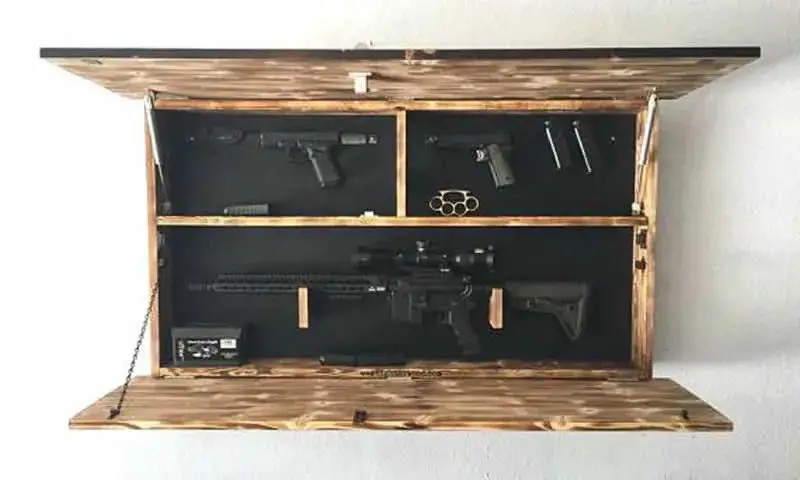
Creating a Custom Gun Cabinet with DIY Shelves and Compartments
A gun cabinet is an essential piece of equipment for responsible gun owners. It provides a safe and secure storage solution, protecting firearms from unauthorized access and accidental discharge. While pre-built cabinets are readily available, crafting your own offers the advantage of customizability, allowing you to tailor the design to your specific needs and preferences. This guide provides a comprehensive walkthrough of building a DIY gun cabinet with adjustable shelves and compartments.
Materials and Tools
Before embarking on this project, it is crucial to gather the necessary materials and tools. The exact list may vary based on your desired size and features. However, here is a general list:
- Wood: Cabinet-grade plywood, hardwood, or particleboard
- Screws: Wood screws of various lengths
- Hinges: Heavy-duty cabinet hinges
- Drawer slides: For drawers, if desired
- Locks: Keyed or combination locks for security
- Paint or stain: For finishing
- Wood glue
- Measuring tape
- Level
- Circular saw or table saw
- Jigsaw or coping saw
- Drill with various drill bits
- Screwdriver
- Clamps
- Safety glasses and gloves
Design Considerations
The design phase is crucial, as it determines the overall functionality and aesthetics of the cabinet. Carefully consider the following factors:
Size and Dimensions
Determine the required size based on the number and types of firearms you intend to store. Consider the dimensions of your firearms and accessories, leaving sufficient space for safe and organized storage.
Configuration
Decide on the configuration of shelves and compartments. For long guns, you might prefer vertical shelves with sufficient height. For handguns, adjustable shelves with dividers can offer a well-organized storage solution.
Features
Consider including features like drawers for accessories, a locking mechanism, and a built-in compartment for cleaning supplies. If desired, incorporate a display shelf to showcase prized firearms.
Style
Choose a style that complements your home decor. Traditional designs often feature solid wood construction and intricate details. Contemporary designs may prioritize clean lines and minimalist aesthetics.
Construction Steps
Once the design is finalized, proceed with the construction process, following these steps:
Cutting the Wood
Using your chosen woodworking tools, cut the wood according to your dimensions. Accurately measure and mark the wood before cutting to ensure precise fit. Remember to consider the thickness of the wood when determining the overall dimensions.
Assembling the Cabinet Frame
Begin by assembling the cabinet frame using wood glue and screws. Start with the sides, then attach the bottom and top panels. Use clamps to ensure a secure bond. Be sure to check for squareness throughout the assembly process.
Adding Shelves and Compartments
The key to a customizable gun cabinet lies in the shelves and compartments. You can create adjustable shelves by incorporating shelf pins or dowels. For compartments, use wood dividers or strips of wood to create dedicated sections within the shelves.
Installing Doors
Attach the cabinet doors using heavy-duty hinges. Before securing the hinges, ensure the doors are properly aligned and close smoothly. Consider using a combination of hinges and latches for added security.
Installing Locks
Install the chosen locks on the doors. Ensure the locks are robust and properly secured to the cabinet frame. You may need to drill pilot holes to facilitate installation.
Finishing Touches
Once the assembly is complete, apply paint or stain to achieve the desired aesthetic. Sand the wood surface before applying any finish to achieve a smooth, even coating.
Safety Precautions
Building a gun cabinet involves using tools and materials that require safety precautions. Follow these guidelines to minimize the risk of injuries:
- Always wear safety glasses and gloves during the construction process.
- Use caution when operating power tools. Read the manufacturer's instructions carefully and follow all safety procedures.
- Store tools properly when not in use.
- Keep the work area clean and free from debris.
- Ensure proper ventilation while working with paints, stains, or glues.
Maintenance Tips
Proper maintenance ensures the longevity and functionality of your DIY gun cabinet. Consider these tips:
- Regularly inspect the hinges, latches, and locks for wear and tear.
- Replace any damaged or missing parts promptly.
- Periodically clean and dust the interior and exterior of the cabinet.
- Avoid storing firearms in a damp environment, as this can cause rust and corrosion.
Conclusion
Creating a custom gun cabinet with DIY shelves and compartments is a rewarding project that combines craftsmanship and functionality. By carefully planning and executing the steps outlined above, you can build a secure and personalized storage solution for your firearms. Remember to prioritize safety throughout the construction process and to maintain the cabinet regularly to ensure its longevity and effectiveness.
0 comments:
Post a Comment